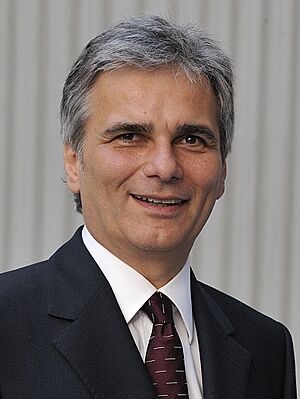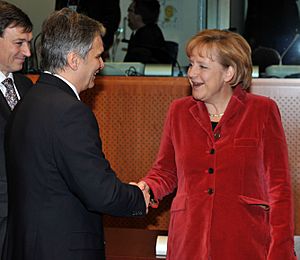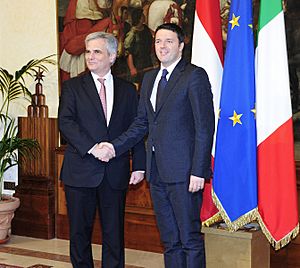Werner Faymann facts for kids
Quick facts for kids
Werner Faymann
|
|
|---|---|

Faymann in 2015
|
|
| Chancellor of Austria | |
| In office 2 December 2008 – 9 May 2016 |
|
| President | Heinz Fischer |
| Vice-Chancellor | Josef Pröll Michael Spindelegger Reinhold Mitterlehner |
| Preceded by | Alfred Gusenbauer |
| Succeeded by | Christian Kern |
| Chair of the Social Democratic Party | |
| In office 8 August 2008 – 9 May 2016 |
|
| Preceded by | Alfred Gusenbauer |
| Succeeded by | Christian Kern |
| Minister of Transport, Innovation and Technology | |
| In office 11 January 2007 – 2 December 2008 |
|
| Chancellor | Alfred Gusenbauer |
| Preceded by | Hubert Gorbach |
| Succeeded by | Doris Bures |
| Member of the National Council | |
| In office 29 October 2013 – 16 December 2013 |
|
| Nominated by | Himself |
| Affiliation | Social Democratic Party |
| In office 28 October 2008 – 2 December 2008 |
|
| Nominated by | Himself |
| Affiliation | Social Democratic Party |
| Personal details | |
| Born | 4 May 1960 Vienna, Austria |
| Political party | Social Democratic Party |
| Spouse | Martina Ludwig |
| Children | 2 |
| Signature |  |
Werner Faymann (born on May 4, 1960) is an Austrian politician who used to be the Chancellor of Austria. He was also the leader of the Social Democratic Party of Austria (SPÖ) from 2008 to 2016. He stepped down from both roles on May 9, 2016, because some people in his party were not happy with his leadership.
Contents
Early Life and Family
Werner Faymann was born in Vienna, Austria. He went to school there and later studied at the University of Vienna. He studied subjects like law, political science, and art history.
Faymann is a Roman Catholic. He is married for the second time and has two children.
Political Journey
Starting in Politics
In 1981, Werner Faymann became the leader of the Socialist Youth group in Vienna. This was a youth organization linked to the Social Democratic Party.
From 1985 to 1988, he worked as an advisor for a bank called Zentralsparkasse. This bank had close ties to the city government, which was led by the Social Democrats. After that, he became the director of a group that helped people with housing issues in Vienna.
Later, Faymann became a member of Vienna's local government. He worked on different projects related to building homes and improving parts of the city.
Becoming a Minister
In 2007, Faymann became the Minister for Transport, Innovation, and Technology. He worked in the government led by Chancellor Alfred Gusenbauer. He also helped coordinate the different parties working together in the government.
People soon started to see Faymann as a possible future Chancellor. In June 2008, Chancellor Gusenbauer decided to step down as party leader. On June 16, 2008, Faymann took over as the leader of the Social Democratic Party of Austria (SPÖ). He then led the party in the special election held on September 28, 2008.
Before this election, Faymann and Gusenbauer announced a change in their party's view on new agreements with the European Union. They wrote an open letter to the editor of a large newspaper, which caused some debate within their party.
The other main party, the Austrian People's Party (ÖVP), ended their partnership with the SPÖ, which led to the new elections. Even though Faymann's party lost some seats, they still won more seats and votes than the Austrian People's Party. After the election, Faymann formed a new government with the Austrian People's Party, just as he had promised.
Serving as Chancellor of Austria

Because his party won the most seats in the National Council of Austria, President Heinz Fischer asked Faymann to form a new government on October 8, 2008.
The SPÖ and the ÖVP agreed to form a government together on November 23, 2008. This new government officially started on December 2, 2008.
In 2013, some questions were raised about whether Faymann and an aide had influenced state-owned companies to place advertisements promoting him when he was the infrastructure minister. Austrian authorities looked into the matter, but they ended their investigation in November 2013.
On May 9, 2016, Faymann resigned as Chancellor and party leader. This happened after his party's candidate did not do well in the first round of the 2016 presidential election. The election results showed that many people were looking for change, and Faymann decided to step down.
Political Views



During his time as Chancellor, Faymann's party became a bit more cautious about the European Union. However, he always kept his distance from far-right political groups. In Austria, his government made many changes in areas like education and social support.
At first, Faymann supported German Chancellor Angela Merkel in helping many refugees who were coming to Europe. Austria welcomed about 90,000 asylum-seekers in 2015. This was more than 1% of its population. However, public support for his approach decreased. The country's systems struggled to manage the large number of arrivals. Later, Faymann criticized Merkel's slow approach to Europe's economic problems. He asked for stronger actions to fight unemployment in Europe. Actions to slow down the number of people entering Austria then caused some tension between the two countries.
In September 2015, during a time when many people were moving across Europe, Faymann spoke about Hungary's decision to tell refugees a train was going to the capital, but it was actually going to a refugee camp. He said this reminded him of a very dark time in Europe's past. In response, Hungary called the Austrian ambassador to discuss the comment.
After Politics
In August 2016, the UN Secretary-General appointed Faymann as a special envoy. His job was to work on the issue of youth unemployment around the world.
In September 2016, Faymann and his former spokesperson started their own company in Vienna. They now work as communication consultants.
See also
 In Spanish: Werner Faymann para niños
In Spanish: Werner Faymann para niños
- First Faymann government
- Second Faymann government
- Politics of Austria
 | Charles R. Drew |
 | Benjamin Banneker |
 | Jane C. Wright |
 | Roger Arliner Young |

